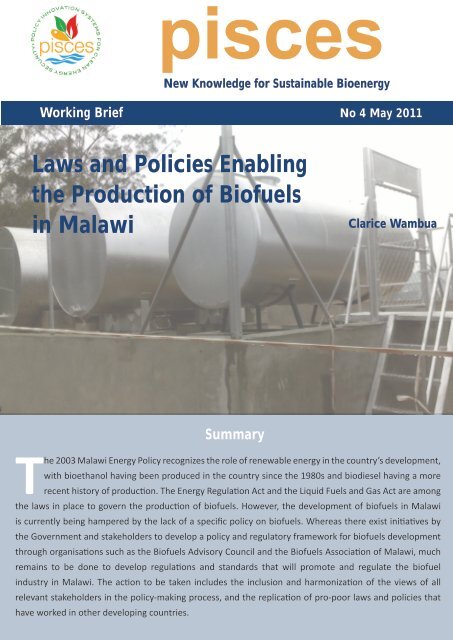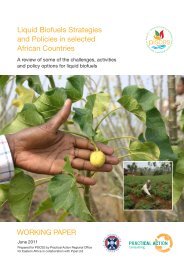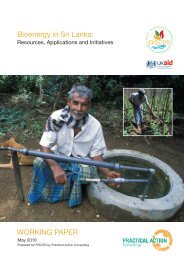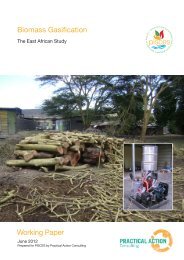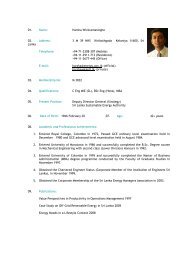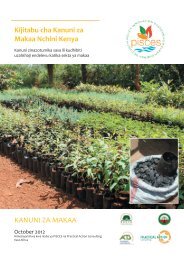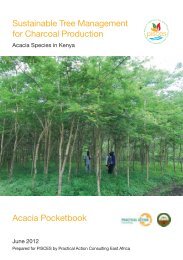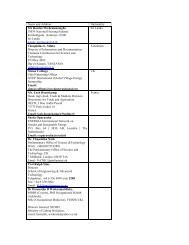Laws and Policies Enabling the Production of Biofuels in ... - Pisces
Laws and Policies Enabling the Production of Biofuels in ... - Pisces
Laws and Policies Enabling the Production of Biofuels in ... - Pisces
Create successful ePaper yourself
Turn your PDF publications into a flip-book with our unique Google optimized e-Paper software.
pisces<br />
New Knowledge for Susta<strong>in</strong>able Bioenergy<br />
Work<strong>in</strong>g Brief No 4 May 2011<br />
<strong>Laws</strong> <strong>and</strong> <strong>Policies</strong> <strong>Enabl<strong>in</strong>g</strong><br />
<strong>the</strong> <strong>Production</strong> <strong>of</strong> Bi<strong>of</strong>uels<br />
<strong>in</strong> Malawi<br />
Clarice Wambua<br />
Summary<br />
The 2003 Malawi Energy Policy recognizes <strong>the</strong> role <strong>of</strong> renewable energy <strong>in</strong> <strong>the</strong> country’s development,<br />
with bioethanol hav<strong>in</strong>g been produced <strong>in</strong> <strong>the</strong> country s<strong>in</strong>ce <strong>the</strong> 1980s <strong>and</strong> biodiesel hav<strong>in</strong>g a more<br />
recent history <strong>of</strong> production. The Energy Regulation Act <strong>and</strong> <strong>the</strong> Liquid Fuels <strong>and</strong> Gas Act are among<br />
<strong>the</strong> laws <strong>in</strong> place to govern <strong>the</strong> production <strong>of</strong> bi<strong>of</strong>uels. However, <strong>the</strong> development <strong>of</strong> bi<strong>of</strong>uels <strong>in</strong> Malawi<br />
is currently be<strong>in</strong>g hampered by <strong>the</strong> lack <strong>of</strong> a specific policy on bi<strong>of</strong>uels. Whereas <strong>the</strong>re exist <strong>in</strong>itiatives by<br />
<strong>the</strong> Government <strong>and</strong> stakeholders to develop a policy <strong>and</strong> regulatory framework for bi<strong>of</strong>uels development<br />
through organisations such as <strong>the</strong> Bi<strong>of</strong>uels Advisory Council <strong>and</strong> <strong>the</strong> Bi<strong>of</strong>uels Association <strong>of</strong> Malawi, much<br />
rema<strong>in</strong>s to be done to develop regulations <strong>and</strong> st<strong>and</strong>ards that will promote <strong>and</strong> regulate <strong>the</strong> bi<strong>of</strong>uel<br />
<strong>in</strong>dustry <strong>in</strong> Malawi. The action to be taken <strong>in</strong>cludes <strong>the</strong> <strong>in</strong>clusion <strong>and</strong> harmonization <strong>of</strong> <strong>the</strong> views <strong>of</strong> all<br />
relevant stakeholders <strong>in</strong> <strong>the</strong> policy-mak<strong>in</strong>g process, <strong>and</strong> <strong>the</strong> replication <strong>of</strong> pro-poor laws <strong>and</strong> policies that<br />
have worked <strong>in</strong> o<strong>the</strong>r develop<strong>in</strong>g countries.<br />
POLICY INNOVATION SYSTEMS FOR CLEAN ENERGY SECURITY<br />
1<br />
<strong>Pisces</strong> work<strong>in</strong>g briefM4 Malawi.<strong>in</strong>dd 1<br />
24.05.2011 10:48:09 AM
Table <strong>of</strong> Contents<br />
Introduction 3<br />
The Policy Framework 3<br />
The Legal Framework 3<br />
Conclusions <strong>and</strong> Recommendations 5<br />
Endnotes 6<br />
Bibliography 7<br />
2 POLICY INNOVATION SYSTEMS FOR CLEAN ENERGY SECURITY<br />
<strong>Pisces</strong> work<strong>in</strong>g briefM4 Malawi.<strong>in</strong>dd 2<br />
24.05.2011 10:48:09 AM
Introduction<br />
Reports <strong>in</strong>dicate a grow<strong>in</strong>g <strong>and</strong><br />
unprecedented <strong>in</strong>terest <strong>in</strong><br />
<strong>the</strong> production <strong>and</strong> use <strong>of</strong> bi<strong>of</strong>uels<br />
worldwide (Worldwatch Institute,<br />
2007: xvii). However, African countries<br />
have historically <strong>of</strong>ten had<br />
challenges ensur<strong>in</strong>g that effective<br />
regulatory structures are <strong>in</strong> place to<br />
deal with new technologies (Molony<br />
<strong>and</strong> Smith, 2010). In <strong>the</strong> case <strong>of</strong><br />
bi<strong>of</strong>uels, <strong>the</strong> ris<strong>in</strong>g <strong>in</strong>terest <strong>in</strong> this<br />
technology <strong>in</strong> African countries <strong>in</strong><br />
<strong>the</strong> absence <strong>of</strong> effective laws <strong>and</strong><br />
policies govern<strong>in</strong>g <strong>the</strong> sector is<br />
detrimental as policy <strong>in</strong>struments<br />
are recognized as vital to <strong>the</strong> development<br />
<strong>of</strong> robust bi<strong>of</strong>uel <strong>in</strong>dustries<br />
(Worldwatch, 2007:279). In<br />
turn, policy drives law, <strong>and</strong> a sound<br />
legal <strong>and</strong> regulatory framework is<br />
now well recognized as necessary<br />
if <strong>the</strong> risks <strong>of</strong> negative impacts <strong>of</strong><br />
bi<strong>of</strong>uels are to be m<strong>in</strong>imized <strong>and</strong><br />
<strong>the</strong> benefits maximized <strong>in</strong> both <strong>the</strong><br />
immediate <strong>and</strong> long term (FAO,<br />
2009; FAO, 2007).<br />
The Policy Framework<br />
The level <strong>of</strong> production <strong>of</strong> bi<strong>of</strong>uels<br />
<strong>in</strong> Malawi is relatively high, but is<br />
currently not at levels sufficient to<br />
meet dem<strong>and</strong>. 1 There are currently<br />
only two ma<strong>in</strong> bioethanol production<br />
companies, produc<strong>in</strong>g an average<br />
<strong>of</strong> 18 million litres <strong>of</strong> bioethanol<br />
(GoM, 2003). Biodiesel <strong>in</strong>volves a<br />
number <strong>of</strong> private companies <strong>and</strong><br />
Non-Governmental Organisations<br />
(NGOs), but <strong>in</strong> light <strong>of</strong> a more recent<br />
history <strong>of</strong> commercial production,<br />
only 18 million jatropha trees<br />
have so far been planted (BAM,<br />
2010:3), though more companies<br />
are show<strong>in</strong>g <strong>in</strong>creased <strong>in</strong>terest<br />
<strong>in</strong> <strong>in</strong>vest<strong>in</strong>g <strong>in</strong> <strong>the</strong> sector (GoM,<br />
2010).<br />
As production is hampered by <strong>the</strong><br />
absence <strong>of</strong> a specific policy document<br />
on bi<strong>of</strong>uels, <strong>the</strong>re have been<br />
concerted efforts by stakeholders<br />
<strong>in</strong> <strong>the</strong> bi<strong>of</strong>uels <strong>in</strong>dustry to provide<br />
<strong>in</strong>put on <strong>the</strong> creation <strong>of</strong> an appropriate<br />
bi<strong>of</strong>uels policy, for example<br />
by present<strong>in</strong>g position papers <strong>and</strong><br />
policy proposals <strong>and</strong> impact assessment<br />
reports on bi<strong>of</strong>uels <strong>in</strong><br />
Malawi to <strong>the</strong> government (See for<br />
example, BAM, 2010). Key among<br />
<strong>the</strong>se stakeholders is <strong>the</strong> Bi<strong>of</strong>uels<br />
Association <strong>of</strong> Malawi. 2 This is a<br />
non-pr<strong>of</strong>it organization which aims<br />
to promote <strong>the</strong> establishment <strong>of</strong> a<br />
viable bi<strong>of</strong>uels <strong>in</strong>dustry <strong>in</strong> Malawi<br />
(BAM, 2009a:4), <strong>and</strong> has been <strong>in</strong>strumental<br />
<strong>in</strong> promot<strong>in</strong>g <strong>the</strong> development<br />
<strong>of</strong> a bus<strong>in</strong>ess environment<br />
conducive to <strong>the</strong> bi<strong>of</strong>uels <strong>in</strong>dustry.<br />
Despite membership be<strong>in</strong>g open to<br />
a wide range <strong>of</strong> actors <strong>in</strong> <strong>the</strong> <strong>in</strong>dustry<br />
(ibid: 5), <strong>the</strong> found<strong>in</strong>g members<br />
<strong>of</strong> <strong>the</strong> association are currently<br />
among <strong>the</strong> most active organisations<br />
<strong>in</strong> <strong>the</strong> grow<strong>in</strong>g <strong>of</strong> jatropha for<br />
<strong>the</strong> production <strong>of</strong> biodiesel (BAM,<br />
2009b) <strong>and</strong> as such, certa<strong>in</strong> stakeholders<br />
such as bioethanol producers<br />
<strong>and</strong> poor smallholder farmers<br />
are ill-represented <strong>in</strong> <strong>the</strong> activities<br />
<strong>of</strong> <strong>the</strong> organisation.<br />
Follow<strong>in</strong>g <strong>the</strong> first bi<strong>of</strong>uels<br />
stakeholder workshop held <strong>in</strong><br />
November 2008 <strong>in</strong> Malawi, an<br />
advisory council known as <strong>the</strong><br />
Bi<strong>of</strong>uel Advisory Council 3 was<br />
created, with members from<br />
government <strong>and</strong> <strong>the</strong> private sector<br />
(BAM, 2009b). BAC consists <strong>of</strong><br />
representatives from <strong>the</strong> M<strong>in</strong>istry <strong>of</strong><br />
Energy <strong>and</strong> M<strong>in</strong>es, <strong>the</strong> M<strong>in</strong>istry <strong>of</strong><br />
Agriculture, <strong>the</strong> M<strong>in</strong>istry <strong>of</strong> Industry,<br />
Trade <strong>and</strong> Private Development<br />
<strong>and</strong> <strong>the</strong> M<strong>in</strong>istry <strong>of</strong> F<strong>in</strong>ance, <strong>and</strong> a<br />
private sector representative (BAC,<br />
2009:3). The goal <strong>of</strong> <strong>the</strong> Council<br />
is to develop a policy <strong>and</strong> legal<br />
framework for bi<strong>of</strong>uel production<br />
<strong>in</strong> Malawi, <strong>and</strong> a major challenge<br />
is <strong>the</strong> harmonization <strong>of</strong> <strong>the</strong> various<br />
exist<strong>in</strong>g agricultural <strong>and</strong> energy<br />
policies <strong>and</strong> strategies to provide a<br />
framework for <strong>the</strong> development <strong>of</strong><br />
<strong>the</strong> bi<strong>of</strong>uels <strong>in</strong>dustry (ibid:6).<br />
As it currently st<strong>and</strong>s, different<br />
government m<strong>in</strong>istries are charged<br />
with different responsibilities with<br />
a bear<strong>in</strong>g on <strong>the</strong> development <strong>of</strong><br />
<strong>the</strong> bi<strong>of</strong>uels sector. For example,<br />
<strong>the</strong> M<strong>in</strong>istry <strong>of</strong> Agriculture <strong>and</strong><br />
Food Security, <strong>the</strong> M<strong>in</strong>istry <strong>of</strong><br />
Natural Resources, Energy <strong>and</strong><br />
Environment, <strong>the</strong> M<strong>in</strong>istry <strong>of</strong><br />
POLICY INNOVATION SYSTEMS FOR CLEAN ENERGY SECURITY<br />
3<br />
<strong>Pisces</strong> work<strong>in</strong>g briefM4 Malawi.<strong>in</strong>dd 3<br />
24.05.2011 10:48:10 AM
F<strong>in</strong>ance, <strong>the</strong> M<strong>in</strong>istry <strong>of</strong> Industry<br />
<strong>and</strong> Trade <strong>and</strong> <strong>the</strong> M<strong>in</strong>istry<br />
<strong>of</strong> Education, Science <strong>and</strong><br />
Technology all have differ<strong>in</strong>g<br />
policies yet perform functions that<br />
impact on <strong>the</strong> bi<strong>of</strong>uels <strong>in</strong>dustry.<br />
BAC faces a challeng<strong>in</strong>g task<br />
to harmonise <strong>and</strong> co-ord<strong>in</strong>ate<br />
all <strong>the</strong> diverse responsibilities<br />
<strong>of</strong> <strong>the</strong> different m<strong>in</strong>istries to<br />
create a coherent bi<strong>of</strong>uel policy<br />
<strong>and</strong> legislative framework. In<br />
accomplish<strong>in</strong>g its task, BAC has<br />
been work<strong>in</strong>g on a position paper<br />
on <strong>the</strong> issues <strong>and</strong> challenges<br />
<strong>in</strong> <strong>the</strong> bi<strong>of</strong>uels sector <strong>in</strong> Malawi,<br />
<strong>and</strong> proposes policies to ensure<br />
susta<strong>in</strong>able production <strong>of</strong> bi<strong>of</strong>uels<br />
<strong>in</strong> <strong>the</strong> country (BAC, 2009).<br />
The Legal Framework<br />
Malawi has laws <strong>in</strong> place to govern<br />
<strong>the</strong> bi<strong>of</strong>uels <strong>in</strong>dustry. Among <strong>the</strong>se<br />
laws is <strong>the</strong> Energy Regulation<br />
Act which establishes <strong>the</strong> Malawi<br />
Energy Regulatory Authority<br />
(MERA). 4 This is Malawi’s sole<br />
energy regulatory body whose<br />
ma<strong>in</strong> function is to regulate <strong>the</strong><br />
activities <strong>of</strong> <strong>the</strong> energy <strong>in</strong>dustry <strong>in</strong><br />
Malawi <strong>and</strong> is <strong>the</strong> body charged<br />
with <strong>the</strong> function <strong>of</strong> regulat<strong>in</strong>g <strong>the</strong><br />
bi<strong>of</strong>uels sector.<br />
In addition to <strong>the</strong> establishment<br />
<strong>of</strong> MERA, Malawi has formulated<br />
<strong>and</strong> enacted legislation that directly<br />
caters for <strong>the</strong> production<br />
<strong>and</strong> use <strong>of</strong> bi<strong>of</strong>uels through <strong>the</strong><br />
Liquid Fuels <strong>and</strong> Gas (<strong>Production</strong><br />
<strong>and</strong> Supply) Act. The Act def<strong>in</strong>es<br />
liquid fuels <strong>and</strong> gas as <strong>in</strong>clud<strong>in</strong>g<br />
those ‘ref<strong>in</strong>ed from plant organic<br />
materials…’. The Act makes provision<br />
for <strong>the</strong> production, blend<strong>in</strong>g,<br />
extraction, conversion, import<strong>in</strong>g,<br />
transform<strong>in</strong>g, transport<strong>in</strong>g, stor<strong>in</strong>g,<br />
<strong>and</strong> distribut<strong>in</strong>g <strong>of</strong> <strong>the</strong>se fuels.<br />
Its ma<strong>in</strong> objectives are to ensure<br />
that bi<strong>of</strong>uels supply <strong>in</strong> Malawi is<br />
adequate, reliable, efficient <strong>and</strong><br />
economical for <strong>the</strong> country <strong>and</strong><br />
<strong>the</strong> consumers. The Act also aims<br />
to create favourable conditions for<br />
new participants <strong>and</strong> <strong>in</strong>vestors, <strong>in</strong><br />
order to exp<strong>and</strong> <strong>the</strong> <strong>in</strong>dustry. 5<br />
The Liquid Fuels <strong>and</strong> Gas Act<br />
prohibits <strong>the</strong> production <strong>of</strong><br />
ethanol fuel <strong>and</strong> biodiesel without<br />
a production licence, which is<br />
obta<strong>in</strong>ed from MERA. 6 Under <strong>the</strong><br />
Act, conditions to be fulfilled by<br />
<strong>the</strong> licensee <strong>in</strong>clude obta<strong>in</strong><strong>in</strong>g an<br />
environmental impact study/fil<strong>in</strong>g<br />
an environmental management<br />
plan so as to ensure production<br />
risks to <strong>the</strong> environment are kept<br />
at a m<strong>in</strong>imum. 7 Once granted, a<br />
licence may be valid for one to<br />
five years, <strong>and</strong> will be suspended<br />
by MERA <strong>in</strong> <strong>the</strong> case <strong>of</strong> violations<br />
<strong>of</strong> provisions <strong>of</strong> <strong>the</strong> Act concern<strong>in</strong>g<br />
<strong>the</strong> protection <strong>of</strong> occupational<br />
safety, health <strong>and</strong> welfare,<br />
public safety, public health <strong>and</strong><br />
<strong>the</strong> environment. The licence is<br />
revocable where <strong>the</strong> holder fails to<br />
remedy <strong>the</strong> violations, or repeats<br />
<strong>the</strong>m. 8<br />
Bear<strong>in</strong>g <strong>in</strong> m<strong>in</strong>d that <strong>the</strong><br />
production <strong>of</strong> bi<strong>of</strong>uels carries<br />
wide-rang<strong>in</strong>g risks, to among<br />
o<strong>the</strong>rs food security, labour rights<br />
<strong>and</strong> gender equity (See Oxfam<br />
2008; Clancy, 2008), licens<strong>in</strong>g<br />
conditions <strong>and</strong> conditions for <strong>the</strong><br />
suspension <strong>and</strong> revocation <strong>of</strong><br />
licenses geared towards ensur<strong>in</strong>g<br />
environmental protection alone<br />
are <strong>in</strong>sufficient <strong>in</strong> creat<strong>in</strong>g an<br />
effective enabl<strong>in</strong>g environment for<br />
<strong>the</strong> production <strong>of</strong> bi<strong>of</strong>uels. In this<br />
regard, a national bi<strong>of</strong>uels policy<br />
that embraces wide-rang<strong>in</strong>g<br />
susta<strong>in</strong>ability pr<strong>in</strong>ciples which can<br />
<strong>in</strong> turn be translated <strong>in</strong>to law (<strong>and</strong><br />
specifically licens<strong>in</strong>g conditions<br />
<strong>and</strong> conditions for revocation <strong>of</strong><br />
licenses), is necessary <strong>in</strong> Malawi<br />
to m<strong>in</strong>imize <strong>the</strong> wide-rang<strong>in</strong>g risks<br />
<strong>of</strong> bi<strong>of</strong>uel production.<br />
Ano<strong>the</strong>r way <strong>of</strong> m<strong>in</strong>imiz<strong>in</strong>g risks <strong>of</strong><br />
production is through <strong>the</strong> enactment<br />
<strong>of</strong> laws that ensure str<strong>in</strong>gent<br />
quality control st<strong>and</strong>ards (Worldwatch,<br />
2007 :152). Accord<strong>in</strong>g to<br />
<strong>the</strong> Liquid Fuels <strong>and</strong> Gas Act,<br />
MERA <strong>in</strong> co-operation with relevant<br />
agencies (<strong>in</strong> this case <strong>the</strong><br />
Malawi Bureau <strong>of</strong> St<strong>and</strong>ards) is<br />
charged with <strong>the</strong> function <strong>of</strong> develop<strong>in</strong>g<br />
<strong>and</strong> establish<strong>in</strong>g national<br />
production st<strong>and</strong>ards <strong>in</strong> l<strong>in</strong>e with<br />
prevail<strong>in</strong>g <strong>in</strong>ternational st<strong>and</strong>ards,<br />
technical specifications <strong>and</strong><br />
4 POLICY INNOVATION SYSTEMS FOR CLEAN ENERGY SECURITY<br />
<strong>Pisces</strong> work<strong>in</strong>g briefM4 Malawi.<strong>in</strong>dd 4<br />
24.05.2011 10:48:11 AM
codes <strong>of</strong> practice. 9 The agency<br />
may also adopt st<strong>and</strong>ards, specifications<br />
<strong>and</strong> codes <strong>of</strong> practice as<br />
established by organizations recognized<br />
by <strong>the</strong> <strong>in</strong>ternational liquid<br />
fuels <strong>and</strong> gas <strong>in</strong>dustry <strong>in</strong> matters<br />
<strong>of</strong> quality, <strong>in</strong>dustry safety <strong>and</strong><br />
environmental protection. These<br />
must however be adapted tak<strong>in</strong>g<br />
<strong>in</strong>to account <strong>the</strong> socio-economic<br />
realities <strong>of</strong> Malawi’s liquid fuels<br />
<strong>and</strong> gas market <strong>and</strong> <strong>the</strong> technical<br />
conditions. 10<br />
Whereas this provision has been<br />
put <strong>in</strong>to action <strong>in</strong> <strong>the</strong> case <strong>of</strong><br />
bioethanol, <strong>the</strong>re are currently no<br />
set st<strong>and</strong>ards or specifications for<br />
<strong>the</strong> production <strong>of</strong> biodiesel. Though<br />
MERA <strong>of</strong>ficials have witnessed a<br />
grow<strong>in</strong>g number <strong>of</strong> applications for<br />
licences for biodiesel production<br />
<strong>in</strong> <strong>the</strong> recent past, 11 <strong>the</strong> current<br />
lack <strong>of</strong> set st<strong>and</strong>ards is slow<strong>in</strong>g<br />
down <strong>the</strong> process with regards to<br />
<strong>the</strong> development <strong>of</strong> <strong>the</strong> <strong>in</strong>dustry. 12<br />
Aside from slow<strong>in</strong>g down <strong>the</strong><br />
licens<strong>in</strong>g process for biodiesel<br />
<strong>and</strong> <strong>the</strong> development <strong>of</strong> <strong>the</strong><br />
biodiesels <strong>in</strong>dustry as a whole,<br />
<strong>the</strong> lack <strong>of</strong> fuel quality st<strong>and</strong>ards<br />
for biodiesel means that poor<br />
quality batches <strong>of</strong> fuel can easily<br />
enter <strong>the</strong> market. These fuels are<br />
likely to pose a safety risk as well<br />
as have poor performance. The<br />
result<strong>in</strong>g negative experience may<br />
damage consumer confidence <strong>in</strong><br />
bi<strong>of</strong>uels <strong>in</strong> Malawi, as happened<br />
<strong>in</strong> Australia, destroy<strong>in</strong>g ga<strong>in</strong>s<br />
made by <strong>the</strong> bi<strong>of</strong>uels <strong>in</strong>dustry so<br />
far (Worldwatch, 2007:152).<br />
With regards to blend<strong>in</strong>g quotas,<br />
Malawi’s Liquid Fuels <strong>and</strong> Gas<br />
Act provides that <strong>the</strong> M<strong>in</strong>ister <strong>of</strong><br />
Energy has <strong>the</strong> responsibility <strong>of</strong><br />
mak<strong>in</strong>g <strong>the</strong> necessary regulations<br />
to ensure that <strong>the</strong>re is at all times<br />
a cont<strong>in</strong>uous, secure, adequate<br />
supply <strong>of</strong> liquid fuels <strong>and</strong> gas.<br />
In fulfill<strong>in</strong>g this responsibility,<br />
<strong>the</strong> M<strong>in</strong>ister has put <strong>in</strong>to place<br />
under <strong>the</strong> 2009 Liquid Fuels <strong>and</strong><br />
Gas (<strong>Production</strong> <strong>and</strong> Supply)<br />
Regulations, blend<strong>in</strong>g regulations<br />
which stipulate that all fuels should<br />
be blended with a m<strong>in</strong>imum level<br />
<strong>of</strong> organic oxygenates <strong>of</strong> not less<br />
than 10%. Previously, blend<strong>in</strong>g<br />
bioethanol with petrol had been<br />
optional, with a desired maximum<br />
limit for ethanol-petrol blend <strong>of</strong><br />
20:80 (GoM, 2003). This regulation<br />
applies to petrol only <strong>and</strong> <strong>the</strong>re is<br />
currently no m<strong>and</strong>atory blend<strong>in</strong>g<br />
requirement for diesel. Blend<strong>in</strong>g<br />
requirements for biodiesel are<br />
<strong>the</strong>refore also necessary to<br />
develop <strong>the</strong> sector.<br />
Conclusions <strong>and</strong><br />
Recommendations<br />
This report concludes that<br />
although <strong>the</strong>re is an enabl<strong>in</strong>g<br />
environment for bi<strong>of</strong>uel production<br />
<strong>in</strong> Malawi as ev<strong>in</strong>ced by <strong>the</strong><br />
regulations govern<strong>in</strong>g production,<br />
<strong>the</strong>se constitute an <strong>in</strong>effective<br />
environment to govern <strong>the</strong> bi<strong>of</strong>uels<br />
<strong>in</strong>dustry given <strong>the</strong> dearth <strong>of</strong> laws to<br />
regulate all aspects <strong>of</strong> production<br />
<strong>and</strong> <strong>the</strong> lack <strong>of</strong> a national bi<strong>of</strong>uels<br />
policy. Initiatives such as BAM’s<br />
<strong>and</strong> BAC’s though laudable, are<br />
yet to <strong>in</strong>clude <strong>and</strong> harmonise <strong>the</strong><br />
views <strong>of</strong> all stakeholders <strong>in</strong> <strong>the</strong><br />
bi<strong>of</strong>uels <strong>in</strong>dustry. On this basis,<br />
<strong>the</strong> report recommends that:<br />
• The Malawi government take<br />
<strong>the</strong> lead <strong>in</strong> work<strong>in</strong>g with <strong>the</strong><br />
stakeholders <strong>in</strong> <strong>the</strong> policy process<br />
to harmonize <strong>the</strong> work <strong>of</strong><br />
<strong>the</strong> different government m<strong>in</strong>istries<br />
with regards to bi<strong>of</strong>uels,<br />
as well as implement<strong>in</strong>g stakeholder<br />
proposals on a susta<strong>in</strong>able<br />
production policy. This<br />
can be through a national organization<br />
such as that set up<br />
by <strong>the</strong> Government <strong>of</strong> Mali, <strong>the</strong><br />
National Bi<strong>of</strong>uels Development<br />
Agency, which co-ord<strong>in</strong>ates all<br />
<strong>the</strong> bi<strong>of</strong>uels issues <strong>in</strong> Mali.<br />
• The needs <strong>of</strong> <strong>the</strong> poor are<br />
prioritized <strong>in</strong> <strong>the</strong> law <strong>and</strong><br />
policy-mak<strong>in</strong>g process. This<br />
is through <strong>the</strong> participation<br />
<strong>of</strong> poor smallholder farmers<br />
<strong>and</strong> o<strong>the</strong>r vulnerable groups<br />
<strong>in</strong> <strong>the</strong> policy-mak<strong>in</strong>g process<br />
as well as concerted focus<br />
on <strong>the</strong> replication <strong>of</strong> pro-poor<br />
laws <strong>and</strong> policies that have<br />
worked <strong>in</strong> o<strong>the</strong>r countries.<br />
For example, consideration <strong>of</strong><br />
<strong>the</strong> work<strong>in</strong>g <strong>in</strong> Malawi <strong>of</strong> <strong>the</strong><br />
Brazilian government’s ‘social<br />
POLICY INNOVATION SYSTEMS FOR CLEAN ENERGY SECURITY<br />
5<br />
<strong>Pisces</strong> work<strong>in</strong>g briefM4 Malawi.<strong>in</strong>dd 5<br />
24.05.2011 10:48:12 AM
fuel seal’ which <strong>of</strong>fers <strong>in</strong>centives<br />
to companies that buy <strong>the</strong>ir<br />
feedstock from poor farmers by<br />
<strong>of</strong>fer<strong>in</strong>g <strong>the</strong>m tax breaks (Clancy,<br />
2008: 425), as agriculture<br />
provides employment for over<br />
three quarters <strong>of</strong> Malawi’s<br />
population consist<strong>in</strong>g ma<strong>in</strong>ly <strong>of</strong><br />
smallholder farmers 13 .<br />
• There be set up <strong>in</strong> Malawi an<br />
<strong>in</strong>dependent Policy Work<strong>in</strong>g<br />
Group (PWG) such as that <strong>in</strong>itiated<br />
by <strong>the</strong> PISCES programme<br />
<strong>in</strong> Kenya, Sri Lanka <strong>and</strong> Tanzania<br />
to develop a consultative<br />
<strong>and</strong> participatory policy methodology,<br />
to discuss policy issues<br />
<strong>and</strong> guide policy statements on<br />
bi<strong>of</strong>uels. This will help ensure<br />
that all <strong>in</strong>terested groups <strong>and</strong><br />
<strong>in</strong>dividuals are <strong>in</strong>volved <strong>in</strong> <strong>the</strong><br />
process <strong>of</strong> develop<strong>in</strong>g <strong>the</strong> bi<strong>of</strong>uels<br />
<strong>in</strong>dustry.<br />
Endnotes<br />
1 For example, <strong>the</strong> 2003 Energy Policy notes that <strong>the</strong> 20:80 maximum limit set for ethanol-petrol<br />
blend<strong>in</strong>g could not be met due to ethanol underproduction (GoM, 2003:80).<br />
2 Here<strong>in</strong>after referred to as BAM.<br />
3 Here<strong>in</strong>after referred to as BAC.<br />
4 Section 3<br />
5 See Section 4 <strong>and</strong> 5<br />
6 See Section 9<br />
7 See Section 10<br />
8 See Section 23<br />
9 See Section 32<br />
10 ibid<br />
11 Interview with MERA, June 2010.<br />
12 Interview with MERA, June 2010.<br />
13 See http://www.undp.org.mw (accessed on 09.05.2011)<br />
6 POLICY INNOVATION SYSTEMS FOR CLEAN ENERGY SECURITY<br />
<strong>Pisces</strong> work<strong>in</strong>g briefM4 Malawi.<strong>in</strong>dd 6<br />
24.05.2011 10:48:12 AM
Bibliography<br />
1. Bi<strong>of</strong>uels Advisory Council (BAC) (2009) Malawi Bi<strong>of</strong>uel Draft Position Paper, BAC, Lilongwe.<br />
2. Bi<strong>of</strong>uels Association <strong>of</strong> Malawi (BAM) (2009a) Bi<strong>of</strong>uels Association <strong>of</strong> Malawi Constitution (draft), BAM,<br />
Lilongwe.<br />
3. Bi<strong>of</strong>uels Association <strong>of</strong> Malawi (BAM) (2009b) M<strong>in</strong>utes <strong>of</strong> <strong>the</strong> First Meet<strong>in</strong>g <strong>of</strong> <strong>the</strong> Jatropha Bi<strong>of</strong>uel<br />
Association <strong>of</strong> Malawi, dated February 18 th , 2009.<br />
4. Bi<strong>of</strong>uels Association <strong>of</strong> Malawi (BAM) (2010) Macro Economic Impact Assessment <strong>of</strong> Jatropha Bi<strong>of</strong>uel<br />
<strong>Production</strong> <strong>and</strong> Policy Measures Needed <strong>in</strong> Malawi: A First Discussion, BAM, Lilongwe.<br />
5. Clancy, J. (2008) Are Bi<strong>of</strong>uels Pro-Poor : Assess<strong>in</strong>g <strong>the</strong> Evidence, The European Journal <strong>of</strong><br />
Development Research, Vol.20 (3): 416-431.<br />
6. Food <strong>and</strong> Agriculture Organization (FAO) (2007) Recent Trends <strong>in</strong> <strong>the</strong> Law <strong>and</strong> Policy <strong>of</strong> Bioenergy<br />
<strong>Production</strong>, Promotion <strong>and</strong> Use, FAO, Rome.<br />
7. Food <strong>and</strong> Agriculture Organization (FAO) (2009) Case Studies on Bioenergy Policy <strong>and</strong> Law: Options<br />
for Susta<strong>in</strong>ability, FAO, Rome.<br />
8. GoM (Government <strong>of</strong> Malawi) (2004) Energy <strong>Laws</strong>, Republic <strong>of</strong> Malawi, Government Pr<strong>in</strong>ter,<br />
Lilongwe.<br />
9. GoM (Government <strong>of</strong> Malawi) (2003) National Energy Policy, Department <strong>of</strong> Energy Affairs, Lilongwe.<br />
10. GoM (Government <strong>of</strong> Malawi) (2009) 2009 Malawi Millennium Development Goals Report, M<strong>in</strong>istry <strong>of</strong><br />
Development Plann<strong>in</strong>g <strong>and</strong> Co-operation, Lilongwe.<br />
11. GoM (Government <strong>of</strong> Malawi) (2009a) 2009 Economic Report, M<strong>in</strong>istry <strong>of</strong> Development Plann<strong>in</strong>g <strong>and</strong><br />
Co-operation, Lilongwe.<br />
12. GoM (Government <strong>of</strong> Malawi) (2010) M<strong>in</strong>ister <strong>of</strong> F<strong>in</strong>ance Budget Speech for <strong>the</strong> F<strong>in</strong>ancial Year<br />
2010/2011. Available at http://www.f<strong>in</strong>ance.gov.mw/budgetS2010.pdf. (Accessed on 18 th June 2010).<br />
13. MERA (Malawi Energy Regulatory Authority) (2009) Malawi Energy Regulatory Authority Strategy<br />
on Bi<strong>of</strong>uels, Paper Presented by Chimwemwe Dunkalo on 19 th November 2009 at Malawi Bi<strong>of</strong>uels<br />
Stakeholders Workshop.<br />
14. Molony, T. <strong>and</strong> Smith J. (2010) Bi<strong>of</strong>uels, Food Security <strong>and</strong> Africa, Journal <strong>of</strong> African Affairs, vol 109<br />
(436): 489-498.<br />
15. Oxfam (2008), Ano<strong>the</strong>r Inconvenient Truth: How Bi<strong>of</strong>uel <strong>Policies</strong> are Deepen<strong>in</strong>g Poverty <strong>and</strong> Accelerat<strong>in</strong>g<br />
Climate Change, Oxfam Brief<strong>in</strong>g Paper, Oxfam International.<br />
16. Worldwatch Institute (2007) Bi<strong>of</strong>uels for Transport: Global Potential <strong>and</strong> Implications for Susta<strong>in</strong>able<br />
Energy <strong>and</strong> Agriculture, Earthscan, London.<br />
POLICY INNOVATION SYSTEMS FOR CLEAN ENERGY SECURITY<br />
7<br />
<strong>Pisces</strong> work<strong>in</strong>g briefM4 Malawi.<strong>in</strong>dd 7<br />
24.05.2011 10:48:13 AM
PISCES<br />
Policy Work<strong>in</strong>g Group (PWG)<br />
Policy Innovation Systems for Clean Energy<br />
Security (PISCES) is a five-year Research Programme<br />
Consortium funded by <strong>the</strong> UK’s Department<br />
for International Development (DFID) to<br />
develop new knowledge for susta<strong>in</strong>able use <strong>of</strong><br />
bioenergy to improve energy access <strong>and</strong> livelihoods<br />
<strong>in</strong> poor communities. PISCES is led by <strong>the</strong><br />
African Centre for Technology Studies (ACTS)<br />
Kenya with lead partners Practical Action, M.S.<br />
Swam<strong>in</strong>athan Research Foundation (MSSRF), <strong>the</strong><br />
University <strong>of</strong> Dar es Salaam <strong>and</strong> <strong>the</strong> University<br />
<strong>of</strong> Ed<strong>in</strong>burgh toge<strong>the</strong>r with a network <strong>of</strong> national<br />
<strong>and</strong> <strong>in</strong>ternational partners <strong>and</strong> collaborators.<br />
The Policy Work<strong>in</strong>g Group (PWG) <strong>of</strong> PISCES<br />
is an expert work<strong>in</strong>g group whose objective<br />
is to develop a consultative <strong>and</strong> participatory<br />
policy methodology to discuss <strong>the</strong> policy<br />
issues <strong>and</strong> guide policy statements on bioenergy.<br />
The group aims to achieve this by<br />
br<strong>in</strong>g<strong>in</strong>g toge<strong>the</strong>r policy makers, stakeholders<br />
<strong>and</strong> experts to develop a comb<strong>in</strong>ed methodology<br />
on participatory policy dialogue<br />
<strong>and</strong> apply <strong>the</strong> same <strong>in</strong> develop<strong>in</strong>g bioenergy<br />
policy with a focus on Kenya <strong>and</strong> Sri Lanka.<br />
This Work<strong>in</strong>g Brief is based on research conducted <strong>in</strong> June 2010 for a dissertation<br />
towards <strong>the</strong> award <strong>of</strong> M.Sc. Africa <strong>and</strong> International Development at <strong>the</strong> Centre <strong>of</strong> African<br />
Studies, University <strong>of</strong> Ed<strong>in</strong>burgh<br />
Contact: clarice.wambua@gmail.com<br />
Disclaimer<br />
Although this research is funded by DFID, <strong>the</strong> views expressed <strong>in</strong> this Work<strong>in</strong>g Paper are entirely<br />
those <strong>of</strong> <strong>the</strong> author <strong>and</strong> do not necessarily represent DFID’s own policies or views. Any<br />
discussion <strong>of</strong> <strong>the</strong>ir content should <strong>the</strong>refore be addressed to <strong>the</strong> author <strong>and</strong> not to DFID.<br />
For fur<strong>the</strong>r <strong>in</strong>formation contact:<br />
Project Manager, Bernard O. Muok<br />
E-mail: b.muok@acts.or.ke, <strong>in</strong>fo@acts.or.ke, Website: www.pisces.or.ke<br />
Phone: +254 20 712 68 90/95, Fax: +254 20 233 90 93<br />
8 POLICY INNOVATION SYSTEMS FOR CLEAN ENERGY SECURITY<br />
<strong>Pisces</strong> work<strong>in</strong>g briefM4 Malawi.<strong>in</strong>dd 8<br />
24.05.2011 10:48:14 AM


